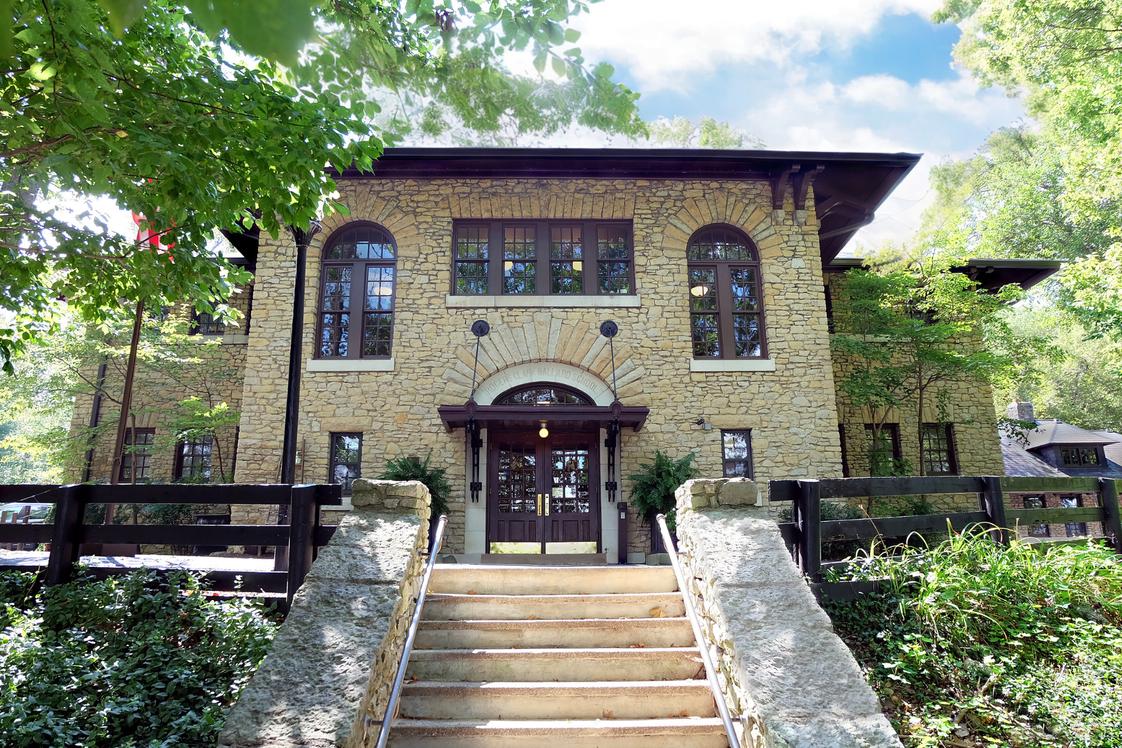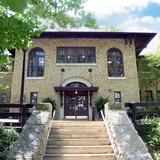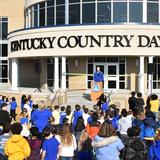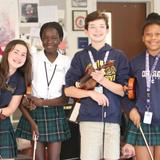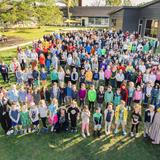Chance School is the only fully dedicated early childhood education program in Louisville, offering education from Preschool to 5th grade.
Our evidenced-based Progressive Education curriculum is recognized for its innovative, best-in-class implicit instruction focused on inquiry-based learning.
Virginia Chance School offers rigor in a collaborative environment designed to build self-motivation, a growth mindset, and critical thinking skills with immersive nature-based learning for all students.
Inside our bright, busy classrooms and outside on our magical wooded campus, students learn through hands-on discovery and group project work.
It's an ideal place for children to develop a lifelong love of learning and connections. A captivating childhood education awaits.
Quick Stats (2024-25)
- Top Ranked KY School
- Grades: Prekindergarten-5
- Yearly Tuition: $20,450
- Average class size: 14 students
- Application Deadline: None / Rolling
- Source: Verified school update
Top Rankings
The Virginia Chance School ranks among the top 20% of private schools in Kentucky for:
Category
Attribute
Student Body
School Overview
Religious Affiliation
Grades Offered
Grades Prekindergarten-5
Year Founded
1958
Student Body
Total Students
n/a
Student Body Type
Co-ed
% Students of Color
32%
State avg.: 12%
Academics and Faculty
Total Classroom Teachers
50 teachers
% Faculty w/Advanced Degree
85%
Average Class Size
14 students
Matriculation DataMatric. Data
Classroom Dress Code
Casual
Play Clothes Encouraged
Tuition and Acceptance Rate
Admission Deadline
None / Rolling
Yearly Tuition Cost
$20,450
Tuition Notes
Preschool ranges from approx $5000-$12000 depending on amount of days per week and length of day. Elementary tuition is $18,010 per year.
% on Financial Aid
15%
Admissions Director
Jamie Paradis
Sports
Total Sports Offered
4 sports
Sports
Extracurriculars
Total ExtracurricularsTotal Extra-curric.
6 extracurriculars
ExtracurricularsExtra-curric.
Club or Organization:
Chorus, Outdoor Club, Theatre
Arts and Music Programs:
Art, Music
Recreational Athletic Programs:
Before & After School Care
Chorus, Outdoor Club, Theatre
Arts and Music Programs:
Art, Music
Recreational Athletic Programs:
Before & After School Care
School Notes
- Progressive Education at Virginia Chance School
- Because we offer a progressive education, we:
- Focus on the whole child
- EVERY area of development, cognitive, social, emotional, moral, and physical, are important, and we are intentional to grow them.Each child has the right to be healthy, safe, supported, engaged, and challenged while learning at school.
- Create a caring, learning community
- Each child is nurtured to be part of a loving and nurturing community.Classrooms are like families that help one another, meet together, work out problems together and care for one another.Our sense of community extends into the home as we value a partnership with parents and offer parenting classes that complement our program and philosophy.
- Encourage learning using intrinsic instead of extrinsic motivators
- Children have a voice in their own learning and get to make choices.We help children learn to process what they think and feel about their own work rather than focus on what outsiders think and feel.Learning is its own reward, and we want children to love to learn; therefore, we don't cheapen that with stickers and gold stars or grades.
- Provide active, hands-on, experiential learning opportunities
- Children play an active role in discovering, exploring, creating, and thinking as a necessary part of their learning instead of passive learners who listen to the teacher's lecture and "pour in" facts and information.Teachers serve as facilitators, guides, listeners, questioners, observers, supporters, challengers, and encouragers of the child.An original motto that is still a part of our Mission/Philosophy Statements says it this way:I hear, and I forget.I see, and I remember.I do, and I understand.Learning centers and stations, theme study, experiments, authentic learning experiences, project-based learning projects are abundant.
- Develop critical thinking, problem-solving, and higher-order thinking skills
- Instead of rote memorization and skill and drill methods that only require children to remember, children are provided opportunities to understand and explain, apply and use information in new ways, analyze and differentiate, evaluate and question, and create and construct.Children create their own questions and solve their own problems.Teachers ask questions that lead to discovery and thinking rather than factual, closed questions.These 21st-century learning skills are incorporated daily.
- Focus on collaboration and cooperation
- Students work together with other students, designing projects and solving problems together.Children learn to work with others instead of only do individual work.Teachers model this by collaborating with other teachers and with students.Cooperation, collaboration, and open exchange of ideas are prevalent.These 21st-century learning skills are integrated through cross-curricular learning experiences.
- Treat each child with dignity and respect
- Children are treated with respect in how teachers address them, talk to them and guide them.Stephen Glenn's Developing Capable Young Children and Jane Nelsen's Positive Discipline serve as guidelines for treating children with dignity and respect.Children participate in making the class rules, and self-discipline is valued.
- Focus on process over product
- We think it is more important to teach children how to learn and how to think critically rather than simply what to learn and what to think.Learning is messy, and we welcome that.Creativity is valued over products that look alike and made from a teacher's model or directions.
- Provide developmentally appropriate learning experiences
- Each child is met where he/she is developmentally, and then teachers make sure the learning goals and experiences are suited to that level and challenge them to grow.Teachers know each child well and know how children best learn and develop; this knowledge is combined to create learning experiences in the classroom.Learning is differentiated so that each child works to his/her own potential.
- Give children a voice
- Children are valued, and their interests, ideas, and thoughts matter.The curriculum and classroom environment reflects the students' interests, input, and decisions.Children are provided with authentic leadership opportunities from an early age.
- Provide compassion, social justice, and anti-racism learning
- Children participate in authentic opportunities to help others, our earth, and animals.As a school of compassion, community service and service-learning projects are incorporated into the curriculum.We commit to celebrating our diversity by teaching inclusiveness and anti-racism.Children grow beyond themselves when learning how to embrace and include others.
- Have an integrated curriculum
- Inquiry-based learning is included in all curriculum areas and provides the framework for integrated, related, and meaningful study.Rather than teach in isolated and unrelated subjects, teachers design a curriculum that is authentic and collaborative.Rather than relying on a single textbook, multiple resources, including field trips, are utilized to develop a curriculum.Inquiry-Based Learning is broad enough to dig deeper and provide in-depth investigations rather than surface or more shallow learning.
- Provide authentic assessment
- Children are observed, listened to, and assessed using authentic evaluations that are age-appropriate.Children's assessments are on-going, formal, and informal and provide information on children's learning and, therefore, set goals, guide instruction, and develop curriculum.
- Value outside play and nature-based learning
- Each child plays outside every day, except during heavy rain and thunder.We have 26 acres available to children, including woods, fields, ponds, and Goose Creek.Children experience environmental education through daily natural connections in our woods, gardens, orchard, and chicken coop.We have a program director dedicated to maintaining high levels of nature-based learning and integrating it into the curriculum; our nature-based learning is best practice integration and not just a log-based outdoor play area as with other schools using the same terms.
Source: Verified school update
Frequently Asked Questions
How much does The Virginia Chance School cost?
The Virginia Chance School's tuition is approximately $20,450 for private students and $2,100 for summer students.
What sports does The Virginia Chance School offer?
The Virginia Chance School offers 4 interscholastic sports: Basketball, Cross Country, Soccer and Track and Field.
What is The Virginia Chance School's ranking?
The Virginia Chance School ranks among the top 20% of private schools in Kentucky for: Largest student body.
When is the application deadline for The Virginia Chance School?
The application deadline for The Virginia Chance School is rolling (applications are reviewed as they are received year-round).
School Calendar
View the The Virginia Chance School yearly calendar below. Note key dates such as:
Event
Date
Fall Break- NO SCHOOL (Events)
October 03, 2024 (Thursday)
Thanksgiving Break- NO SCHOOL (Events)
November 25, 2024 (Monday)
Spring Break- NO SCHOOL (Events)
March 31, 2025 (Monday)
Last Day of School- Early Dismissal (Events)
May 23, 2025 (Friday)
School Closed- Memorial Day (Events)
May 26, 2025 (Monday)
School Reviews
Endorse The Virginia Chance School. Endorsements should be a few sentences in length. Please include any comments on:
- Quality of academic programs, teachers, and facilities
- Availability of music, art, sports and other extracurricular activities
- Academic or athletic awards
Recent Articles

Filling Your Seats
This article provides valuable insights for marketing staff at small private schools, focusing on strategies to boost enrollment and retention. It addresses common challenges such as budget constraints, resistance to change, and the need for both short-term and long-term planning. With expert advice and real-world examples, this guide is essential for any school looking to thrive in a competitive educational landscape.
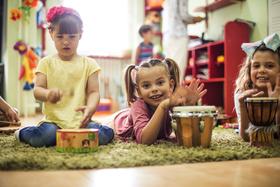
July 31, 2024
Early Childhood Education: Which Approach to Choose?Explore the world of early childhood education with our comprehensive guide to Montessori, Waldorf, and Reggio Emilia approaches. Learn the key principles, benefits, and practical considerations of each method to make an informed decision for your 2-3 year old's educational journey.

July 29, 2024
Your 10-Step Guide to Choosing a Private SchoolSelecting the best private school for your child is a significant decision that requires careful consideration and research. Our "10 Step Guide for Choosing a Private School" provides a detailed roadmap to help parents navigate this complex process. This guide covers everything from assessing your child's unique needs and researching potential schools to evaluating academic programs and exploring financial aid options. Whether you're looking for a school that offers PK-12 or just high school grades, this guide will equip you with the knowledge and tools to make the best choice for your child's education.

